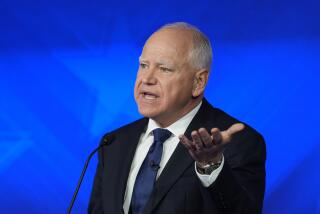Activist Wu, Jailed in China, Is Healthy, U.S. Official Reports : Asia: Visit is first since release of video in which American admits to lying in documentaries. Backers say he was coerced.
- Share via
BEIJING — Chinese American human rights activist Harry Wu “appears to be in good health and reasonably good spirits,” a U.S. Embassy official reported after meeting him in a Wuhan prison Wednesday.
Dan Piccuta, a consular services official, talked briefly with Wu in the second meeting allowed since Wu was detained by China on June 19 during a clandestine mission to document China’s gulag system.
Although details of their discussion were not made immediately available, a State Department spokesman in Washington said that Piccuta brought prescription medicine, letters from Wu’s wife, and Chinese and American newspapers and books. He also was expected to petition Chinese officials to allow Wu to grant power of attorney to a representative in the United States to take care of his legal affairs.
Wu, whom the Chinese accuse of “illegally sneaking into China, obtaining China’s state secrets and conducting criminal activities,” is not allowed by Chinese law to discuss his case with U.S. officials or to consult an attorney until he is formally charged.
The authorities say they are still in the pretrial investigation phase. Espionage is a capital offense in China, but U.S. government officials are pushing for Wu’s release.
In Washington, the State Department spokesman said that Piccuta discussed Wu’s legal case briefly with him and reported that Wu said he has not been mistreated but has back pain from a previous condition.
Concern about Wu’s well-being heightened in late July after a state-linked television company released a videotape showing him confessing during interrogation. Wu, slouched in a chair and looking haggard, said that he “deliberately falsified facts” in documentaries he produced with the British Broadcasting Corp. about prison labor and the sale of Death Row prisoners’ organs for transplant.
Human rights groups have denounced the video, saying Wu’s “confession” could have been coerced. Piccuta’s visit was the first since the video’s release.
Prisoners are allowed only one carefully monitored meeting per month. During the last meeting, on July 10, U.S. consular official Arturo Macias said he and Wu were separated by a glass partition and talked by telephone while a guard listened and others watched. They were warned that if their talk touched on Wu’s charges, the visit would be cut short.
Wu’s arrest came during an already low period in U.S.-China relations.
In a recent attempt to repair Sino-U.S. ties, Chinese Foreign Minister Qian Qichen and Secretary of State Warren Christopher, meeting in Brunei, discussed a possible summit between the countries’ top leaders this autumn.
But Christopher made Wu’s release a factor in the talks, saying it would be “very difficult . . . to envision” a summit until after Wu’s release.
Wu’s wife, Ching Lee Wu, has urged Hillary Rodham Clinton not to visit Beijing for an international women’s conference in September if her husband is still imprisoned. The First Lady’s advance team is in Beijing, proceeding with preparations for her visit.
Meanwhile, with less than a month left before the Fourth World Conference on Women, Chinese police have started rounding up the few dissidents in Beijing not already in custody, friends said Wednesday. Prominent among them was Tong Zeng, who has been trying to win compensation for Chinese victims of Japanese war atrocities. The Associated Press reported that he was taken from his home Tuesday afternoon by three officers.
Tong told the news service that police let him go a little less than 24 hours later with a warning: not to hold news conferences or make any trouble until after the U.N.-sponsored conference, scheduled for Sept. 4-15.
Times staff writer Norman Kempster in Washington contributed to this report.
More to Read
Sign up for Essential California
The most important California stories and recommendations in your inbox every morning.
You may occasionally receive promotional content from the Los Angeles Times.










